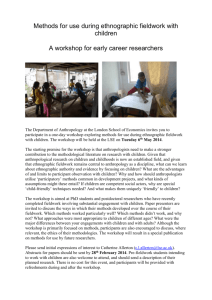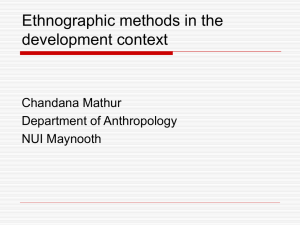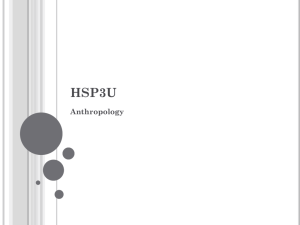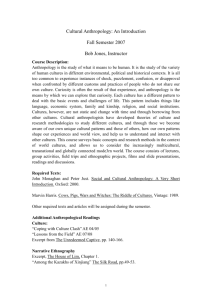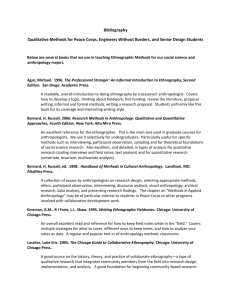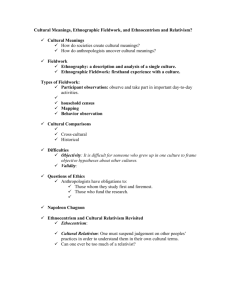Haviland_Cultural 03.ppt
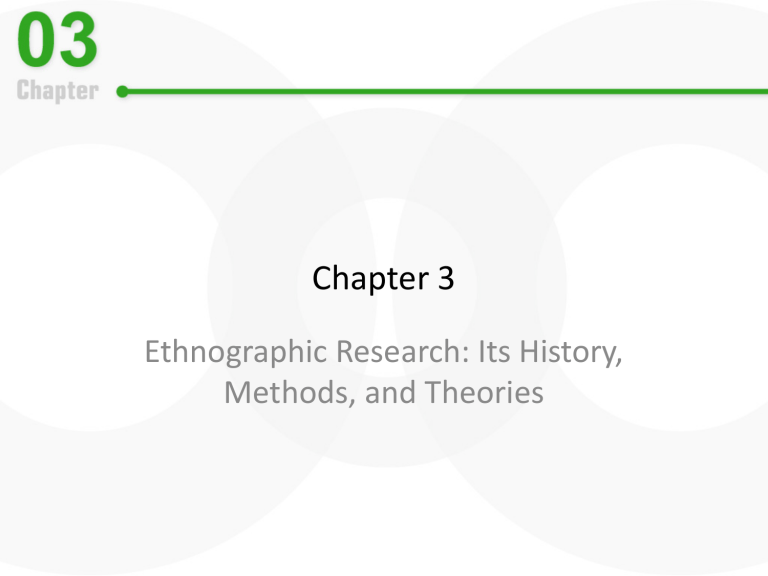
Chapter 3
Ethnographic Research: Its History,
Methods, and Theories
What Will You Learn?
• Explain why fieldwork is essential to ethnology
• Situate historical changes in research questions and applications within their economic, social, and political contexts
• Describe ethnographic research challenges
• Relationships between methods and theory
• Understand key theoretical perspectives in anthropology
• Recognize the ethical responsibilities of anthropological research
History of Ethnographic Research and
Its Uses
• Anthropology emerged as a formal discipline during the height of colonialism when
European anthropologists focused on the study of traditional peoples and their cultures.
• There are various types of ethnographic studies, each serving a different function and taking a different approach.
Urgent/Salvage Anthropology
• With expanding western domination many cultures have become extinct or are on the verge of extinction due to a violent history.
• Since anthropologists cannot stop violent or forced cultural changes they have tried to document what is left of these endangered cultures through a technique known as urgent
anthropology: ethnographic research that documents endangered cultures.
Acculturation Studies
• In the 1930s, anthropologists began researching
“culture contact,” the study of how traditional cultures change when they come in contact with expanding larger societies.
• Today these studies are referred too as acculturation
studies.
• Indigenous or native cultures that come into contact with more dominant cultures often change drastically.
These changes cause cultures to adapt quickly to a new way of life such as abandoning native languages, religious beliefs, or social practices.
• As a result, these societies are left in despair and poverty unable to survive in the new forced culture.
Applied Anthropology
• In 1941 the international Society for Applied
Anthropology was founded.
• Acculturation studies gave birth to applied
anthropology - the use of anthropological knowledge and methods to solve practical problems in communities confronting new challenges.
• Governmental officials whom earlier had begun programs to assimilate native cultures into mainstream culture quickly realized they were faced with larger problems.
• They begun to enlist the help of anthropologists to develop government programs to reduce poverty, promote literacy, and other issues.
“Culture at a Distance”
• During WWII (1939-1945) and the Cold War, some anthropologists shifted their attention from small-scale traditional communities to modern state societies.
• The aim was to discover basic personality traits, or psychological profiles, shared by the majority of the people in modern state societies.
• During war time, on-location fieldwork was impossible so they would focus on the analysis of newspapers, literature, photographs, and films.
This information was sometimes used as propaganda and psychological warfare for countries at war.
Studying Contemporary State Societies
• While there were theoretical flaws in the national character studies, this type of research became more than just a war-related endeavor.
• Anthropologists recognized that a generalized understanding of human relations, ideas, and behavior all depends on knowledge of all cultures and peoples, including those in complex, large-scale industrial societies organized in political states.
Peasant Studies
• Peasantry represents the largest social category of our species so far. They fall into a category between modern industrial society and traditional subsistence foragers, herders, farmers, and fishers.
• Because peasant unrest over economic and social problems fuels political instability, anthropological studies of rural populations are considered significant and practical.
• Anthropologists began to focus in on the smaller scale indigenous communities to offer insight on how to deal with peasants resisting challenges to their traditional way of life.
Advocacy Anthropology
• Once European colonial powers had relinquished almost all of their overseas domains in the 1960s, anthropologists turned their attention to newly independent countries of Asia and Africa.
• Some anthropologists have gone beyond just studies of peasant cultures and become an advocate for them. This is known as advocacy
anthropology: research that is community based and politically involved.
• These anthropologists are committed to social justice, humans rights, and the preservation of ethnic minority culture.
Studying Up
• Since anthropologists have a mission to understand the human condition in its full cross-cultural range, anthropologist Laura
Nader has encouraged other ethnographers to
“study up.”
• A focus on western elites, government bureaucracies, global corporations, philanthropic foundations, media empires, business clubs, etc.
Critical Thought
• What obstacles do you foresee with the “study up” campaign?
• How can these obstacles be overcome?
• What is the significance to studying the world’s most powerful?
Multi-Sited Ethnography
• Globalization has given rise to a new trend in ethnographic research known as multi-sited
ethnography: the investigation and documentation of peoples and cultures embedded in the larger structures of a globalizing world, utilizing a range or methods in various locations of time and space.
• Diasporic populations (displaced/scattered) live away from their homeland including friends and family.
• These will bring theoretical ideas and research methods from cultural studies, media studies, and mass communication.
Digital Ethnography
• Emerging in multi-sited studies are greater interdisciplinary approaches to fieldwork. One example of this development is known as digital ethnography
– An ethnographic study of social networks, communicative practices, and other cultural expressions in cyberspace by means of digital visual and audio technologies; also called cyberethnography or netography
Doing Ethnography
• Ethnographic fieldwork is best defined as extended on-location research to gather detailed and in-depth information on a society’s customary ideas, values, and practices through participation in its collective social life.
• But first this all begins with selecting a research site and a research problem or question.
Site Selection & Research Question
• Anthropologists usually work outside of their own culture, in a foreign country. This is based on the idea that studies done in one’s own culture might bring bias to the research due to the familiarity with the group or culture being studied.
• Research will require several questions to be asked such as:
– Finding funding
– Securing permission to research (government/tribal permission)
– Deciding what focus the research will take
Preparatory Research
• Existing written, visual information available about the people and place.
• Learning a new language.
• Study theoretical, historical, ethnographic, and other literature relevant to the research.
Research Methodology
Summary
• There are many facets to researching a new culture or cultural practice that the ethnography will use:
– Acceptance
– Participant Observant
– Key Consultants
– Quantitative & Qualitative Data
– Interviewing
– Mapping
– Photography & Filming
Participant Observation
• The most significant aspect of ethnographic research is participant observation. A research method in which one learns about a group’s beliefs and behaviors through social participation and personal observation within the community, as well as interviews and discussion with individual members of the group over an extended stay in the community.
Critical Thought
• What might be the benefit to participating and observing?
• Can you think of a situation or example where observation might be allowed but not participation?
• How might this effect research?
Key Consultant
• In order to gain insight into the culture, a particular member might be utilized. Often these key consultants will be a member of the society being studied, who provides information that helps researchers understand the meaning of what they observe.
• They may also provide vital information to the ethnographer about the history of the group.
• Traditionally referred to as informants, this is now considered outdated.
Data Gathering: The Ethnographer’s
Approach
• There are two main types of data collection used in many types of research. Anthropologists utilize both of these:
• Quantitative - Statistical or measurable information, such as demographic composition, the types and quantities of crops grown, or the ratio of spouses born and raised within or outside the community.
• Qualitative - Nonstatistical information such as personal life stories and customary beliefs and practices.
Taking Surveys
• Anthropologists always go into the field equipped with predetermined surveys or questionnaires.
• These might be used after sufficient field experience has passed in order to compose a questionnaire with categories that are culturally relevant.
Interviewing
• Asking questions is fundamental to ethnographic fieldwork and takes place in two ways:
– Informal interview
• An unstructured, open-ended conversation in everyday life.
– Formal interview
• A structured question/answer session carefully notated as it occurs and based on prepared questions.
Eliciting Devices
• Researchers may employ a number of eliciting devices
– Activities and objects used to draw out individuals and encourage them to recall and share information.
– Examples may include:
• Taking a walk
• Asking about particular stories
• Sharing details of one’s own childhood or a fond memory
• Pictures
Mapping
• Because anthropologists often do work in areas where there is little geographic documentation, they may spend time mapping an area.
• Anthropologists may make their own detailed maps documenting culturally relevant geographic features in the landscape inhabited by the people they study.
Photography and Filming
• Ever since film technology developed, anthropologists have used this ability to document cultures.
• In the early 1880s, Franz Boas first took pictures during his fieldwork with the Inuit.
• This technology has enabled the world to visually experience and see cultures in remote places.
Challenges of Ethnographic Fieldwork
• Ethnographic research creates a tough challenge in itself. Often anthropologists must face personal challenges while trying to adjust to a new culture and conduct fieldwork.
Among the numerous mental challenges anthropologists commonly face are
– Culture shock
– Loneliness
– Feeling like an ignorant outsider
– Being socially awkward in a new cultural setting.
• Are there any others you think could pose a challenge?
Challenges of Ethnographic Fieldwork
• Social and political challenges typically include but are not limited to:
– The need to gain acceptance within the community.
– Issues involving the researcher’s age, skin color, ethnicity, religion, or gender.
– Being the center of rivaling groups while trying to maintain a neutral position.
Challenges of Ethnographic Fieldwork
• Physical challenges typically include but are not limited to:
– Adjusting to unfamiliar food, climate, and hygiene conditions.
– The need to be constantly alert to relevant conversations that are significant to one’s research.
– Ethnographers must spend considerable time interviewing, making detailed notes, and analyzing data.
Subjectivity & Reflexivity
• Anthropologists often have to grapple with the challenge of personal bias and remaining objective.
• To accurately describe a culture, an anthropologist needs to seek out and consider three types of data:
1. The people’s own understanding of their culture and the general rules they share.
2. The extent to which people believe they are observing those rules.
3. The behavior that can be directly observed.
• There are many techniques that ethnographers rely on to answer these questions.
Putting it All Together: Completing an
Ethnography
• After collecting ethnographic information, the next challenge is to compile it together in a way that accurately describes the culture.
• Written ethnographies are more traditional but certainly not the only method to document the data.
• Sometimes ethnographic research is documented with sound recordings, photography, and videos alongside writing.
Ethnology: From Description to
Interpretation and Theory
• Ethnology is a branch of cultural anthropology that makes cross-cultural comparisons and develops theories that explain why certain important differences or similarities occur between groups.
• Explanations or interpretations supported by a reliable body of data are called theories.
– A coherent statement that provides an explanatory framework for understanding
Ethnology and the Comparative
Method
• In science, a single instance of a phenomenon is not enough to support a hypothesis- let alone a theory
• Anthropological theories are formulated from worldwide cross-cultural comparisons throughout history.
• The Human Relations Area Files help to make this happen.
– A vast collection of cross-indexed ethnographic, biocultural, and archaeological data catalogued by cultural characteristics and geographic location; archived in about 300 libraries on microfiche and or/online.
Anthropology’s Theoretical
Perspectives: A Brief Overview
• Ethnographers will typically fall into one of two categories for their fieldwork.
• Idealist perspective
– A theoretical approach stressing the primacy of superstructure (ideas and values) in cultural research and analysis.
• Materialist perspective
– A theoretical approach stressing the primacy of infrastructure (material conditions) in cultural research and analysis.
Ethical Responsibilities in
Anthropological Research
• Once an anthropologist is admitted by a culture, they are usually befriended and in some cases “adopted.”
• They may be privy to knowledge that is highly personal, political, sensitive, and destructive in nature.
• This anthropological knowledge about the culture’s organization, motivation, etc. can make them vulnerable to exploitation and manipulation.
Ethical Responsibilities in
Anthropological Research
• The first step is to communicate in advance the nature, purpose, and potential impact of the planned study to individuals who provide the information.
• It is essential that ethnographers receive
informed consent, which is a formal recorded agreement to participate in research.
• When it is a challenge to obtain informed consent, or even impossible to precisely explain the meaning and purpose of this concept and its actual consequences, anthropologists may protect the identities of individuals.

